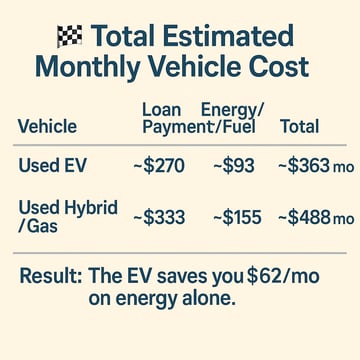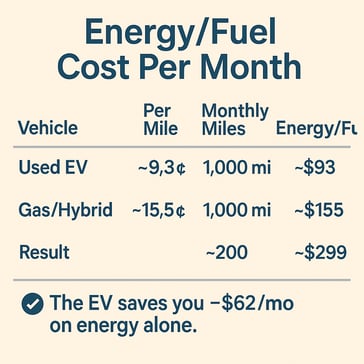🚗 Tired of the Pump? Here’s Why the New California Gas Tax Should Have You Eyeing a Used EV (or at Least Rethink That Hybrid)
Tired of burning cash at the pump? With California’s gas tax climbing again and used EV prices at historic lows, it’s the perfect storm to ditch your old gas guzzler. Right now, you can finance a 3–4 year-old EV with fewer miles, save ~40% per mile on energy, lock in lower monthly payments, and even snag a $4,000 federal credit—all while driving a newer car that’s easier to get approved for, even with rough credit. Bottom line? Switching could cut your total monthly vehicle costs by $125 or more, putting ~$1,500 back in your pocket every year.
🛢️ But That’s Just the Start
California drivers already shoulder some of the highest fuel costs in the nation, thanks to cap-and-trade fees (adding ~54¢/gal) plus the general headaches of refinery maintenance and closures (Phillips 66 in L.A. and Valero in Benicia shutting down by 2026, slicing 20% of state capacity).
Sure, global geopolitics matter—but in the Golden State, local policy and market quirks drive most of your pain at the pump.
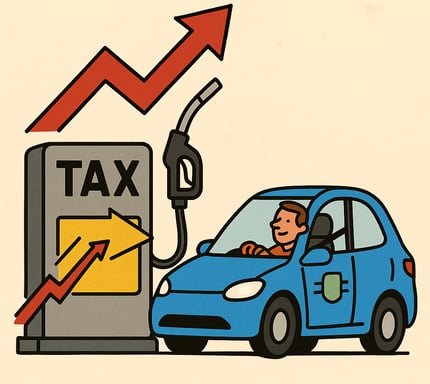

🚀 California’s Gas Tax is Climbing — Here’s Why You Should Jump on a 3–4 Year Old EV Before Everyone Else Figures It Out
Alright, here we go. No time for sugarcoating. Starting July 1, 2025, California drivers are staring down the barrel of higher fuel costs — again. Let’s break it down fast so you know exactly what’s about to drain your wallet:
1. Gasoline excise tax
Up from 59.6¢ to 61.2¢ per gallon — that’s a 1.6¢/gal hike locked in by the CDTFA’s annual inflation bump. No votes needed. It’s automatic.
2. Diesel excise tax
Climbs from 45.4¢ to 46.6¢ per gallon. Same deal.
3. Low Carbon Fuel Standard (LCFS)
This isn’t a tax you see on the receipt, but starting July 1, fuel suppliers face tougher compliance costs. Translation: they’ll just pass it on to you. Estimates put this at +5–9¢ per gallon, but worst-case models go higher.
🔍 So how much more at the pump?
· Guaranteed: +1.6¢/gal from the excise tax.
· Likely bump: +5–9¢/gal from LCFS pass-through.
· Estimated total: around +7–10¢ per gallon starting in July.
But wait. That’s just the starter course. By year’s end, thanks to refinery closures and even tighter supply, the Energy Commission warns you could see another 8–30¢/gal added, pushing the total 2025 jump to 15–40¢/gal.
Policymakers say horror predictions like 65¢ or $8/gal are from academic panic models, not reality — but let’s be honest, how often do these “just modest increases” actually stay modest?
👉 Net result: Expect ~7–10¢/gal more at the pump right away, with even steeper hikes by year’s end as refinery closures tighten supply. Analysts predict we could see another 8–30¢ tacked on by late 2025. So by holiday shopping season, you might pay 15–40¢ more per gallon than today.
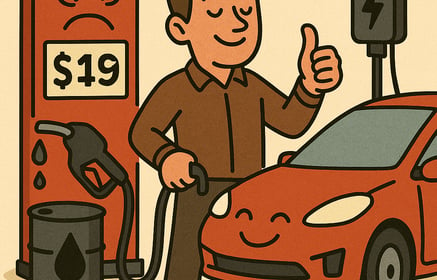

Sick of Feeding the Gas Monster? Try This: Save Money, Upgrade Your Ride—Even With Bumpy Credit
Now here’s where it gets interesting. You’re sick of fueling up at $4.60 (or more) a gallon, and you’re not alone. The average Californian pays ~15–16¢ per mile just in fuel for a typical Camry or CR-V. Compare that to roughly 9¢/mile for an EV charging at home off-peak. That’s a 40–43% savings per mile, not counting reduced maintenance.
And with the market’s latest swings, you can flip the script entirely.
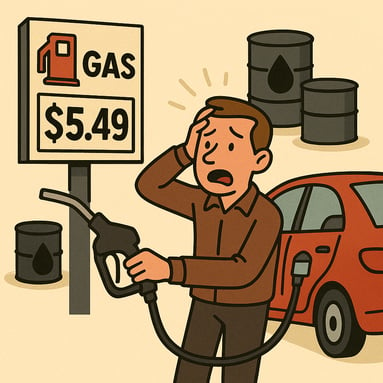

🚘 The sweet spot? 3–4 year old used EVs.
Let’s cut to it. Vehicle prices aren’t dropping. Despite whatever feel-good sound bites come out of D.C. or the auto industry, new car prices keep creeping up. Average financed amounts keep setting new records. Regulatory costs, tariffs, labor pressures — pick your poison, it all funnels down to you paying more.
But here’s the market twist hardly anyone’s talking about loudly:
👉 Used EVs are a screaming deal right now.
Thanks to a flood of off-lease returns, wavering political hype, and some consumers prematurely spooked by EV “doom articles,” prices for lightly-used EVs (like Teslas, Bolts, Leafs) have tumbled. Not just dipped — tumbled.
For instance:
2–3 year old Tesla Model 3s (under 50,000 miles) are often listed at $20K or less.
Knock off the $4,000 federal used EV tax credit (claimed instantly at point of sale under new rules), and you’re at $16K out the door.
That’s not pie-in-the-sky. That’s current reality. You’re talking about getting a nearly-new Model 3 — loaded with tech, still under warranty, with 50,000 fewer miles than the typical hybrid — for less than your neighbor’s last camping trailer.
And here’s a kicker most people miss:
When Tesla values stabilize or rebound (they always do, after these oversupply dips), you might even sell it for more than you paid. That’s what we call emotional arbitrage. Tesla leased too many, too cheap, then people bailed because of Twitter drama or election-year memes. Their loss. Your win.
If you can scrape together a $1–2K down payment, you might only finance $15–16K—meaning lower payments, newer tech, and an easier path to approval. Because banks and credit unions actually prefer lending on cars this age, versus riskier older hybrids.




Source: Cargurus
Source: Cargurus
🤔 “But I Was Looking at a Hybrid…”
Alright, fair enough. Not everyone’s ready to plug in. Maybe you’re still leaning hybrid. Let’s look at what $18K buys you right now in quality used hybrids or equivalent gas models.
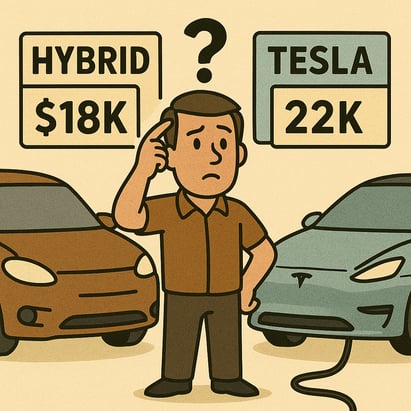



✅ Bottom line?
To land a hybrid at $18K, you’re often looking at vehicles that are 7–10 years old, with 80–130k miles.
By contrast, a $22K used Tesla (post-$4K federal credit = $18K) is a 2021–2022 model, with 30–60k miles, and way easier on your future maintenance bills.
So sure, you can absolutely buy a hybrid — just understand you’re buying more years and more miles for roughly the same cash.




Source: Cargurus
Source: Cargurus
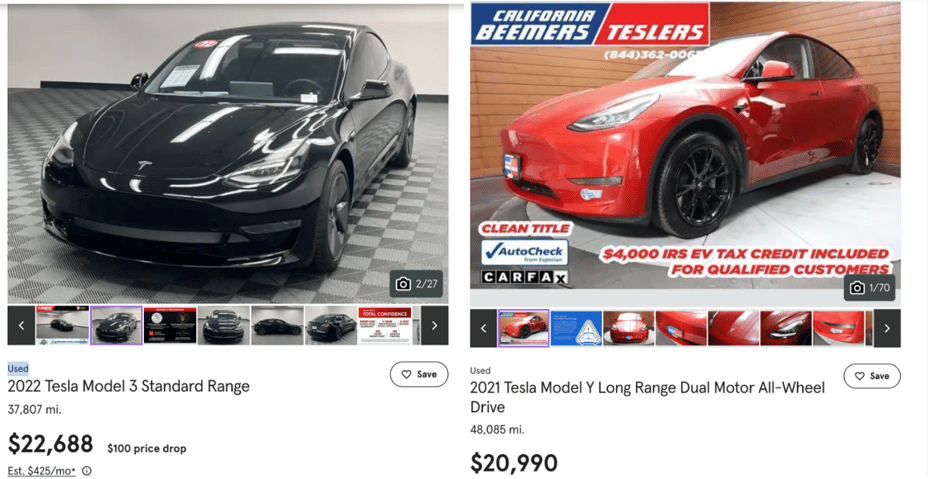



🏦 Why This Matters If Your Credit’s Been… Rocky
This is where it gets good. Because ironically, financing a newer car — even if you have rough credit — is often easier and cheaper than trying to get a bank to underwrite a loan on an older, high-mile hybrid.
🚗 For 3–5 year-old vehicles:
Banks, credit unions, and dealer F&I departments love them.
You’ll likely snag a 60–72 month term, with interest rates ~6–10% if your credit is okay, a bit higher if not.
Often need just 10–15% down, so your $1–2K upfront covers it.
🚙 For 7–9 year-old vehicles:
Still financeable, but lenders sweat it more.
Expect shorter terms (36–60 months max), higher interest rates (10–15%+), and stricter down payment or loan-to-value caps.
If your credit’s below prime, banks may want more down or simply pass you to higher APR specialty lenders.
So yes — you may literally find it simpler to get approved on that newer EV or 3–4 year-old Camry than for a 9-year-old high-mileage RX450h. Crazy, but true. It’s all about collateral risk. A lender knows that 2021 Tesla is still valuable for 5+ more years. A 2014 hybrid? They worry it could age out halfway through your loan.
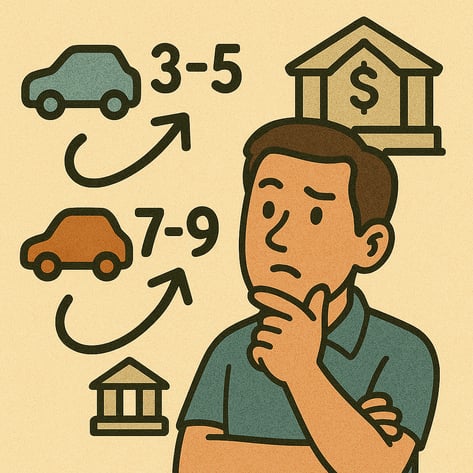

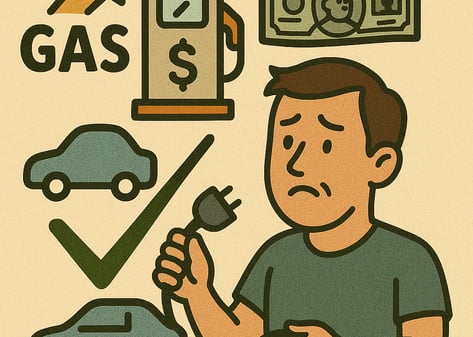

⚡ “Yeah, But California Electricity is Outrageous…”
Absolutely valid. California’s power costs are… well, let’s call them spicy. Here’s a quick snapshot:
But even so, when you run the math on an EV vs gas?
Gas vehicles (Camry/CR-V): ~15–16¢/mile (at ~$4.60/gal)
Home-charged EV: ~9¢/mile (even with CA rates)
Public Level 2 or Superchargers: ~10–12¢/mile
That’s still a 40% savings per mile. And with the new gas taxes creeping in? That gap’s only going to grow.
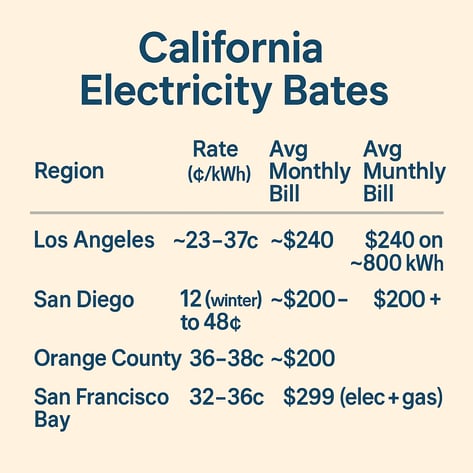

Stop Being Held Hostage by the Pump
After July’s taxes and LCFS hikes, tack on another 7–10¢, with projections putting year-end anywhere from 15–40¢ more per gallon due to refinery closures.
Cost Per Mile Comparison
So yeah, whether you care about climate change or just your monthly budget, EVs crush it on per-mile costs, even under California’s hefty electricity bills.
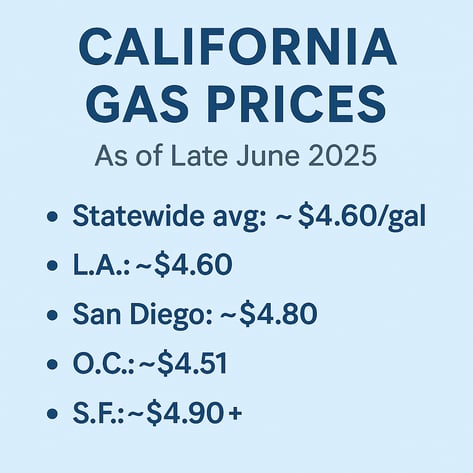

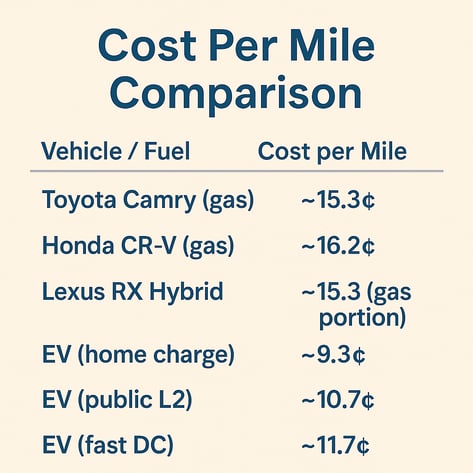

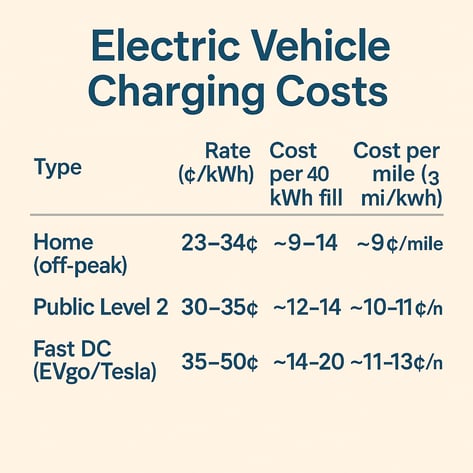

Bottom Line: Don’t Let This Moment Pass You By
Gas is going up. EV prices are down. Banks love lending on them. And Uncle Sam is literally handing you $4,000 to walk off the lot in one.
So if you’re fed up with:
Dumping $80 into your tank every two weeks,
Watching pump prices creep up by the month,
Fighting a tougher bank process just to buy an old high-mileage hybrid…
Then it’s probably time to rethink. Look at a 3–4 year-old EV, pocket the tax credit, pay less per mile, and maybe even flip it for a profit in a year.
💵 Monthly Payment
Tailored Monthly Cost Run: Used EV vs. Used Hybrid vs. Older Gas Car
📌 Scenario
Driving 12,000 miles/year (1,000 mi/month)
Comparing a 3–4 year-old EV, a 7–9 year-old hybrid, and an older gas car
Financing $16,000 (after down payment & used EV tax credit) on EV
Financing $16,000 on hybrid or gas model (no tax credit)
Average interest:
6.5% APR over 72 months (EV, newer)
9% APR over 60 months (older hybrid or gas car)
Energy costs:
EV home charge: ~9.3¢/mile
Gas car: ~15.5¢/mile with new tax bumps
⛽ Energy / Fuel Cost Per Month
🏁 Total Estimated Monthly Vehicle Cost
🎯 Bottom Line
🚀 By picking the newer 3–4 year-old EV, you’d pay about:
~$125/month less overall than the older hybrid/gas option
That’s ~$1,500/year saved — even after factoring in California’s electricity rates.


